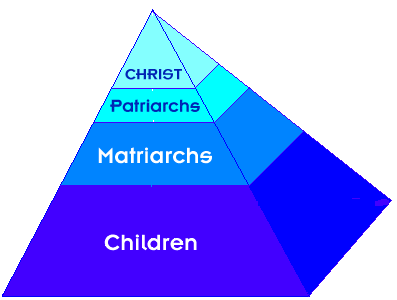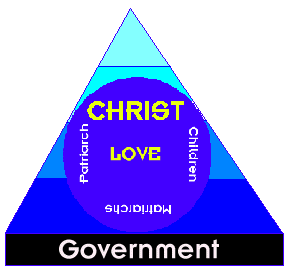




 For a polygamous household to function properly it is quite essential to make the lines of authority clear. This is illustrated in the diagram of the "Patriarchal Pyramid" opposite: the head of the children is the matriarchs (mothers), the head of the matriarchs (mothers) and children is the patriarch (father), and the head of the patriarch (father), matriarchs (mothers), and children is Christ. Once that line of authority is established half the battle of running an orderly and loving family has been won. This is the "legal" side of patriarchal family life.
For a polygamous household to function properly it is quite essential to make the lines of authority clear. This is illustrated in the diagram of the "Patriarchal Pyramid" opposite: the head of the children is the matriarchs (mothers), the head of the matriarchs (mothers) and children is the patriarch (father), and the head of the patriarch (father), matriarchs (mothers), and children is Christ. Once that line of authority is established half the battle of running an orderly and loving family has been won. This is the "legal" side of patriarchal family life.
To summarise, a household is to submit itself to God (James 4:7), a wife (or wives) to her (or their) husband (Ephesians 5:22; Colossians 3:18), and children to their parents (Ephesians 6:1; Colossians 3:20). That is the scriptural pattern and there is none other recognised by God. A polygamous family that does not obey these rules is destined for failure. We may describe this as the "vertical law".
Every law, however, has a spirit which cannot always be clearly defined, and certainly not on paper. I call this the "horizontal law" which is, sadly, often missing in patriarchal households (whether monogamous or polygamous). There are far more New Testament scriptural references to this kind of relationship than the "vertical" one, not because it is more important, but because we need to be constantly reminded of it. And what we need to be constantly be reminded of is usually indicative of the fact that it is not something that comes naturally us but must be learned through self-discipline. Let me explain.
 Christ commanded His saints to "submit to one another" out of reverence for Him (Ephesians 5:21, NIV). This is quite different from a pyramidal structure of authority and at first sight appears contradictory because it seems to imply that there is no line of authority at all. So let us examine this principle a little more closely.
Christ commanded His saints to "submit to one another" out of reverence for Him (Ephesians 5:21, NIV). This is quite different from a pyramidal structure of authority and at first sight appears contradictory because it seems to imply that there is no line of authority at all. So let us examine this principle a little more closely.
A closer examination of the passage reveals that this equality only exists because of the group's "fear of God" (KJV) or "reverence for Christ" (NIV). The heirarchy remains as far as the family (whether domestic or ecclesiastical) is concerned with God as head and everyone else co-equal in love. And this is the key, really: LOVE IS NOT HIERARCHICAL. This distinguishes Old Covenant hierarchy from New Covenant hierarchy: "A NEW commandment I give unto you, That ye love one another; as I have loved you, that ye also love one another" (John 13:34, KJV).
A family living in the love of Christ rarely needs to exercise the pyramidal line of authority because they are completely "one" in purpose, obedience to God's commandments, and love. In practice we know that this is not so, at least no always. Accordingly the pyramidal (vertical) hierarchy exists alongside the horizontal.
This does not, however, imply that ultimately all relationships will be horizontal. When it comes to the grace (undeserved loving kindness) of God, we are all compelled to be horizontal. No man can save himself and no man can save another man. Only Christ saves. We are reduced by the reality of our sinfulness to being equal in our dependancy on God. It is also true that life's circumstances reduces us to dependency on one another. No-one has any particular merit over another, man, woman or child. We all have basically the same needs.
 God demonstrated His love for us by descending to our own level of humanity (Philippians 2:8), in order to demonstrate the non-heirarchical nature of love. This act of self-sacrifice in no way negated His own position as our "Lord and God" (John 20:28). A family, united by love, is mutually-dependent on the free gift of love to one another. Nevertheless, the husband remains the head of the household, and Christ remains the head of the husband. We must therefore picture in our minds a synthesis of the pyramid and circle models shown in the illustrations above to understand how a patriarchal family functions. Love is its heart but a hierarchy is its government. In a moment we will consider how this works in practice.
God demonstrated His love for us by descending to our own level of humanity (Philippians 2:8), in order to demonstrate the non-heirarchical nature of love. This act of self-sacrifice in no way negated His own position as our "Lord and God" (John 20:28). A family, united by love, is mutually-dependent on the free gift of love to one another. Nevertheless, the husband remains the head of the household, and Christ remains the head of the husband. We must therefore picture in our minds a synthesis of the pyramid and circle models shown in the illustrations above to understand how a patriarchal family functions. Love is its heart but a hierarchy is its government. In a moment we will consider how this works in practice.
The responsibility of a patriarch is to preside in love over his family. He needs to steer the family in the direction it is going and to make decisions where there is disagreement. Where there is no disagreement he stands back and lets the family administer itself. He assigns responisbilities to the family members, giving wives and children various stewardships. These responsibilities are not hard and fast and may vary according to circumstances. He is also the "family priest" and leads it as such.
In a household where the husband is the sole bread-winner the lines are very sharply drawn: the husband is responsible for earning the family's daily bread and the wives are responsible for the day to day running of the household. The wives divide the domestic duties by mutual consent according to personal interest, and together we agree on the domestic responsibilities to give to the various children. As far as the division of duties between the wives, I am little involved, with 95% of the decisions being made by them. From time to time there are differences of opinion but usually they work these problems out themselves. Where they cannot, I must intervene and make a decision. In the solution of all problems, grace and self-sacrifice are key elements. Where differences of opinion persist patriarchal leadership becomes very unpleasant indeed. It is a fact that we are rarely happy with all the duties we have. Rotation of duties is a solution.
Some wives pursue careers in order to release their husband for more ministerial duties. We try, wherever possible, to make these careers home-based, especially if a wife pursuing a career has children. This is very important. However, this is not always possible, and means that other wives who remain at home have the responibility of taking care of the career wives' children from time-to-time. With domestic industry it is possible to share these duties as well and this is without a doubt advantageous. Such industriousness, commended in the scriptures (Proverbs 31:10-31), is an inspiration to the children.
The purpose of domestic industry is not to increase wealth for wealth's sake but to free members of the family, especially the husband, for the ministry. Neither is it an "alternative" to raising children. A patriarchal marriage which is not in the business of producing and raising children to the Lord is not, in our view, true patriarchal marriage. Any increase of wealth should, after the tithes and offerings for the Church have been made, be used to increase one's family by adding new wives and having more children, which in turn requires the expanding of home industry, and so on. We are talking about the essense of true multiplication.
The raising of large families ensures that the children have comrades with the same values. By having Christian communities (as we seek to do in the Chavurah Bekorot) this problem is lessened. Large families are particularly important for mutual support as we approach tribulation times and are surrounded by an increasingly hostile world.
A key to the success of a patriarchal marriage is, I firmly believe, industriousness. Idle hands make mischief and this is as true for polygamous marriages as it is for monogamous ones. In obedience to the commandments, we observe a Sabbath say of rest where the minimum of domestic work is performed and "daily bread" work ceases completely. Meals are prepared the day before the Sabbath so that little work is required in serving food. The house is thoroughly cleaned the day before. All activity centres on the Lord. The atmosphere and pace is very different to the other six days of the week where it is fast and fulfilling for those living in the Spirit.
Home-schooling, where this is permitted by the state, is preferred by us for reasons that should be obvious. We can teach correct values and motivate the children by our godly examples. We can also integrate education with daily life - instead of having 9-3 school we punctuate lessons with domestic activities so that the two become, to all intents and purposes, one and the same. There is not, therefore, what one would call "school" and "home" for they are one and the same. This breaks down dichotomies which need not exist - "teachers" and "pupils", "us" and "then", "work" (school) and "free time" (home). It means that we can also follow the Spirit so that some days we will have more formal education than others. By not cramming our children we can start the educational process earlier and make it more enjoyable. Learning should be a joy and not an imposed burden. For this reason theory and practical application are combined as much as possible.
With several wives (who are the "teachers" unless one lives in a community where some of the brethren have teaching r˘les) it means that the same variety of experience can be brought to bear as in a tradition school but with the added benefit of having a teacher who really cares as only a mother or sister-wife can.
It becomes obvious that if a family of this nature is going to work effectively having several wives becomes a great advantage. We recommend four for Deacons, seven for Elders and twelve for Patriarchs as an "ideal" for practical purposes. Obviously with such large families single bread-earners is impractical and one is forced into a family enterprise of sorts - which, we believe, is one of the functions of plural marriage.
From this brief introduction it can be seen that the wives can have a tremendous amount of variety and endless opportunies to multiply their talents. One of my wives is in the process of starting a company of her own and we are encouraging her as much as we can. She is enjoying it tremendously.
Though this polygamous family is 11 years old (and therefore the oldest evangelical Christian one in the world that we know of) we consider ourselves still to be "young" - we wish to expand and experience the true blessings of Abraham, doing the works of the spiritual father of our race (John 8:39; Galatians 3:7). We are seeking any women who love the Lord Jesus Christ with all their hearts and have been fired by a vision of the work we are doing. It doesn't matter where in the world you come from for we can arrange for your relocation. May the blessings of Abraham be yours!



